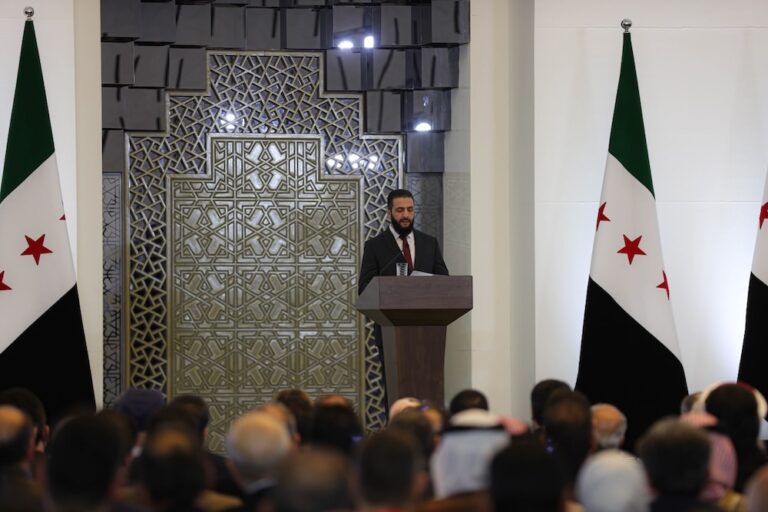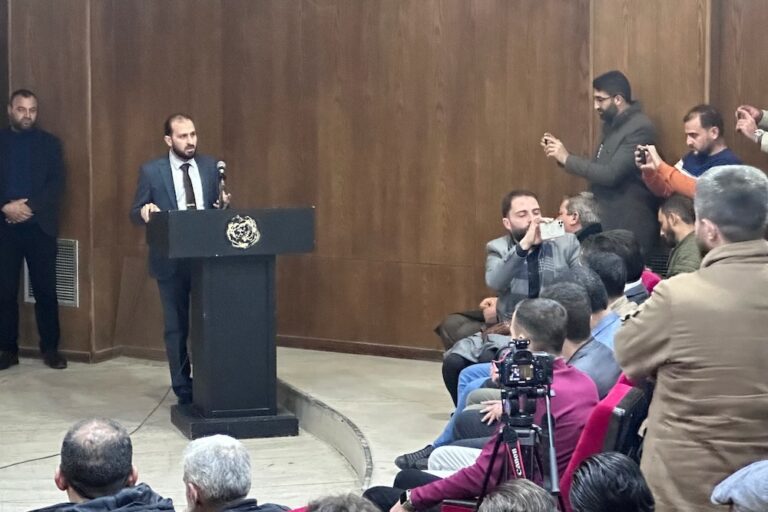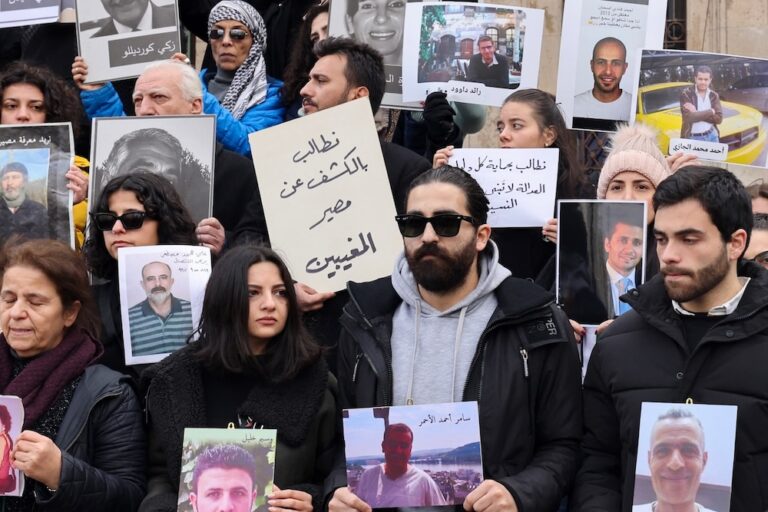In a letter to Syrian President Hafez al-Assad, Human Rights Watch has called for the release of Nizar Nayouf, a 34-year-old writer, journalist and human rights activist, who is serving a ten-year prison term imposed by the State Security Court in 1992 following an unfair trial. Nayouf has been held in solitary confinement in a […]
In a letter to Syrian President Hafez al-Assad, Human Rights
Watch has called for the release of Nizar Nayouf, a 34-year-old
writer, journalist and human rights activist, who is serving a
ten-year prison term imposed by the State Security Court in 1992
following an unfair trial. Nayouf has been held in solitary
confinement in a military prison in Damascus since 1993.
**Updates IFEX alerts dated 11 October and 27 January 1995,
and 24 August 1994; see also IFEX press release
dated 2 August 1996**
In a joint letter sent 1 August 1996, Human Rights Watch, the
Paris-based Reporters sans frontieres and the Moroccan
Organization for Human Rights called on President al-Assad to
release Nayouf and seven other journalists imprisoned in Syria
for their peaceful exercise of freedom of expression and
association (see IFEX press release). This letter went unanswered
by Syrian authorities.
The full text of the 24 September 1996 letter follows.
“His Excellency Hafez al-Assad
President of the Syrian Arab Republic
c/o His Excellency Walid Moualem
Embassy of the Syrian Arab Republic
2215 Wyoming Avenue, N.W.
Washington, D.C. 20008
“Your Excellency:
“Human Rights Watch/Middle East is writing to express urgent
concern about the harsh conditions of confinement for thirty-
four-year-old Nizar Nayouf, a writer, poet and human rights
activist who was sentenced to a ten-year prison term by the
Supreme State Security Court in 1992. According to information
that we received last month, Mr. Nayouf continues to be held in
solitary confinement in Mezze military prison in Damascus. Human
Rights Watch vigorously protests that Mr. Nayouf, a civilian,
remains incarcerated in a military prison where he has been held
in solitary confinement since 1993. In a troubling new
development, it now appears that Mr. Nayouf’s prolonged isolation
from other prisoners has caused him severe psychological stress.
“Our organization has written to you on previous occasions —
most recently in August 1996, when we were joined by Reporters
without Borders in Paris and the Rabat-based Moroccan
Organization for Human Rights — to advocate the release of Mr.
Nayouf and others imprisoned in Syria for the peaceful exercise
of the right to freedom of expression and association. Because
Mr. Nayouf has not yet been released, we are writing now to urge
that he be transferred to a civilian prison and that his solitary
confinement be ended. Human Rights Watch concurs wholeheartedly
with the United Nations Human Rights Committee, which noted in
General Comment 20, adopted at its forty-fourth session in 1992,
that `prolonged solitary confinement of the detained or
imprisoned person may amount to acts prohibited by Article 7 [of
the International Covenant on Civil and Political Rights].’
Article 7 states in its pertinent part: `No one shall be
subjected to torture or to cruel, inhuman or degrading treatment
or punishment.’
“Human Rights Watch respectfully requests information about the
reasons for Mr. Nayouf’s extended solitary confinement in Mezze
prison. If such treatment constitutes punishment for a
disciplinary offense committed by Mr. Nayouf, we would appreciate
being informed of the specific prison regulation(s) that he
violated, and the rules about the types and duration of
punishment for the offense. If the reason for such extended
solitary confinement is in fact punishment, we would also
appreciate information about the date prison authorities informed
Mr. Nayouf of his offense and the date when he was permitted to
present a defense. Such procedures are prescribed in the
internationally recognized Standard Minimum Rules for the
Treatment of Prisoners (`the Rules’). Principle 30(2) of the
Rules states: `No prisoner shall be punished unless he has been
informed of the offense alleged against him and given a proper
opportunity of presenting his defence. The competent authority
shall conduct a thorough examination of the case.’
“Human Rights Watch also respectfully requests that Your
Excellency instruct appropriate authorities to investigate the
reasons for the continuing solitary confinement of Nizar Nayouf,
and to obtain a written report from the medical director of Mezze
prison as to whether such treatment has impaired Mr. Nayouf’s
mental health. Such an inquiry would conform with the Principles
of Medical Ethics relevant to the Role of Health Personnel,
particularly Physicians, in the Protection of Prisoners and
Detainees against Torture and Other Cruel, Inhuman or Degrading
Treatment or Punishment, adopted by General Assembly Resolution
37/194 in 1982. Principle 4(b) states that it is a contravention
of medical ethics for health personnel, particularly physicians,
`[t]o certify, or to participate in the certification of, the
fitness of prisoners or detainees for any form of treatment or
punishment that may adversely affect their physical or mental
health and which is not in accordance with the relevant
international instruments, or to participate in any way in the
infliction of any such treatment or punishment which is not in
accordance with the relevant international instruments.’
Principle 32(1) of the Standard Minimum Rules for the Treatment
of Prisoners forbids the infliction of punishment `that may be
prejudicial to the physical or mental health of a prisoner.’ In
addition, Principle 62 of the Rules states: `The medical services
of the institution shall seek to detect and shall treat any
physical or mental illnesses or defects which may hamper a
prisoner’s rehabilitation. All necessary medical, surgical and
psychiatric services shall be provided to that end.’
“Nizar Nayouf in 1993 received the prestigious Freedom-to-Write
Award from PEN American Center, an affiliate of International
PEN, the association of writers, poets, playwrights, essayists,
editors and novelists. Human Rights Watch has closely followed
Mr. Nayouf’s case since 1992 and, as part of our ongoing
advocacy work on his behalf, we will continue to provide
information about his condition to PEN and other international
human rights organizations. In this regard, any information
provided to us by Syrian authorities about Mr. Nayouf will be
included in future communications with the international
community, including Damascus-based diplomats.”
“We thank Your Excellency in advance for your attention to this
matter, and we look forward to a response from the Syrian
government at the earliest possible convenience.
“Sincerely,
Eric Goldstein
Acting Executive Director”
Background Information
According to an alert originated by Writers in Prison Committee
(WiPC), Nayouf was among seventeen people arrested in December
1991 and January 1992 and tried by State Security between 29
February and 17 March 1992 in connection with a leaflet published
on 10 December 1991 by the Committee for the Defence of
Democratic Freedoms and Human Rights (CDF), of which Nayouf is a
member, detailing human rights abuses during the December 1991
elections. The evidence against them was said to be confessions
reportedly obtained under torture as well as the leaflet itself.
The torture allegations were not investigated and the defendants
reportedly had no access to medical attention. On 17 March 1992,
Nayouf was sentenced to ten years in prison, hard labour and
deprivation of political rights. He was accused of “disseminating
false information” in relation to the leaflet which was said to
have been “intended to create anxiety and to shake the confidence
of the masses in the aims of the revolution” of 8 March 1963. The
government claims that the CDF is a front for a “terrorist”
organisation and that they have incited armed insurrection,
although there appears to have been no evidence of this given at
trial (see IFEX alerts).
Recommended Action
You are encouraged to send similar appeal to authorities
Appeals To
His Excellency Hafez al-Assad
President of the Republic
Presidential Palace
Abu Rummaneh, Al-Rashid Street
Damascus, Syria
Dr Muhammad Harba
Minister of Interior
Ministry of Interior
Marjeh Circle
Damascus, Syria
Hasin Hassun
Minister of Justice
Ministry of Justice
Al-Nasr Street
Damascus, Syria
Dr Muhammad Iyad al-Shatti
Minister of Health
Ministry of Health
Al-Majlis al-Niyabi
Damascus, Syriato the Syrian diplomatic representative in your country
(in Canada and the United States of America)
Embassy of the Syrian Arab Republic
2215 Wyoming Avenue North West
Washington, DC
20008 USA
Fax: +1 202 232 5184
Please copy appeals to the originator if possible.


